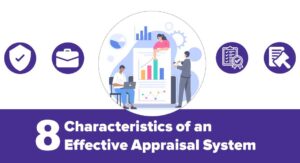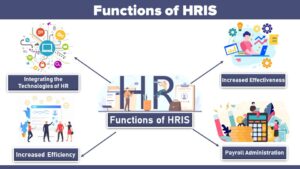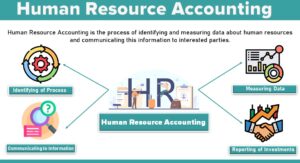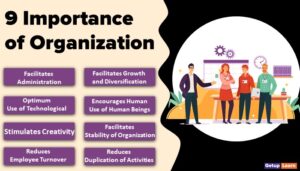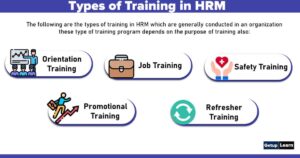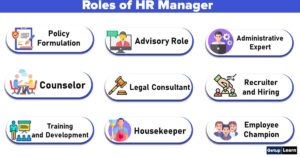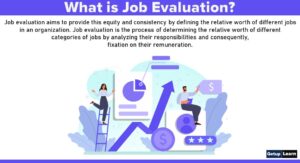Table of Contents
- 1 What is Promotion?
- 2 Definition of Promotion
- 3 Purposes of Promotion in HRM
-
4 Principles of Promotion in HRM
- 4.1 Promotion Policy
- 4.2 Promotion Policy Should Lay Down
- 4.3 Basis of Promotion-seniority or Merit
- 4.4 Job Analysis
- 4.5 Training
- 4.6 Evaluating Employee Performance
- 4.7 Supervisor Should Recommend the Promotion
- 4.8 Provision for the Challenge of a Particular Promotion
- 4.9 Vacancy Should Be Notified to Employees in Advance
- 4.10 Promotion Time Periods
- 5 Types of Promotion in HRM
- 6 FAQ Related to Promotion
What is Promotion?
Promotion is the transfer of an employee to a job that carries higher pay and status. A promotion involves reassigning an employee to a position with increased responsibilities, higher privileges, increased benefits, and more significant potential.
For example, in the vacant post of General Manager Thus, Promotion is a vertical shifting of an employee. The purpose of a promotion is to a Job that is worth more to the organization than the incumbent’s present position.
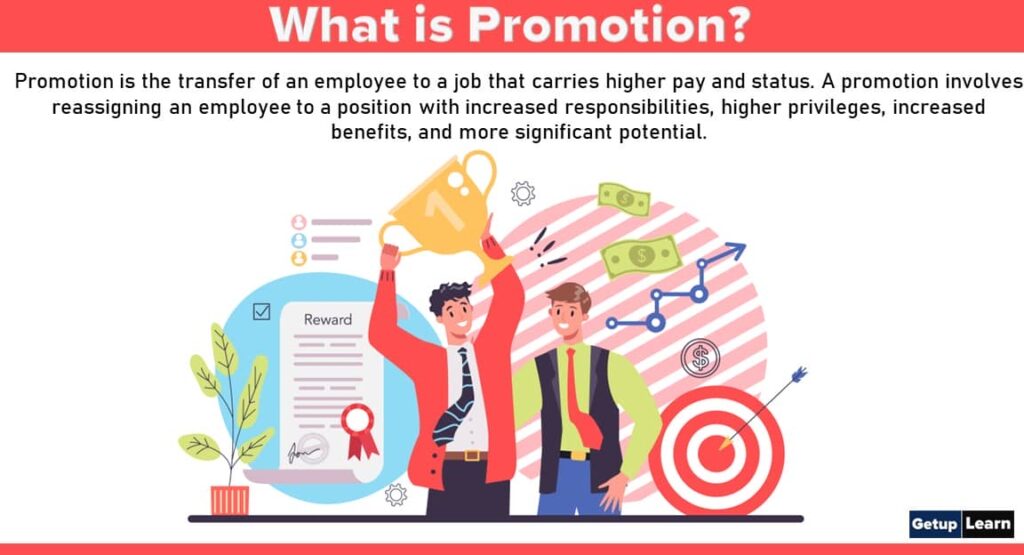
Promotion refers to the upward movement of an employee from a current job to another that is higher in pay, responsibility, status, and organizational level. A mere shifting of an employee to a different job that has better working hours, better location, and more pleasant working conditions does not imply promotion. The new job will be promoted only if it entails increased responsibilities and enhanced pay.
Promotion based either on meritorious performance or continuous service has powerful motivational value. It inspires employees to complete and get ahead of others. Promotions and transfers are activities through which an adjustment in the size of the workforce of an enterprise can be made to cope with the changing situations.
The lateral or vertical movement of an employee within an organization is called ‘internal mobility. It may take place between jobs in various departments or divisions. These functions can be accomplished formally or informally. Usually, formal systems are adopted to ensure operative consistency and efficiency.
Definition of Promotion
These are some simple and easy definitions of promotion:
[su_quote cite=”Pigors and Myres”]Promotion is the advancement of an employee to better job-in terms of greater responsibilities, greater skills, higher status, and higher Pay” The existing employees may be given training for promotion to higher positions in the enterprise. If a vacancy is filled from within the enterprise, it acts as a stimulating force for the employee to develop themselves.[/su_quote]
[su_quote cite=”Scott and Spreigal”]A promotion is the transfer of an employee to a job that pays more money or that enjoys some preferred status.[/su_quote]
[su_quote cite=”Edwin B. Flippo”]A promotion involves a change from one job to another that is better in terms of status and responsibility.[/su_quote]
Purposes of Promotion in HRM
These are the purposes of promotion to achieve the following purposes:
- To put the employee in a position where he will be of greater value to the company. This will imply, utilizing the employee’s skill and knowledge at the appropriate level in the organization’s hierarchy resulting in organizational effectiveness and employee satisfaction.
- To develop competitive spirit and zeal in the employees to acquire the skill and knowledge etc. required by higher level jobs.
- To develop internal sources of employees ready to take jobs at higher levels in the organization. Employees have little motivation if better jobs are reserved for outsiders.
- To promote employee self-development and make them wait their turn for promotions. It reduces labor turnover.
- To build up morale, loyalty, and a sense of belongingness on the part of employees when it is brought home to them that they would be promoted if they deserve it.
- To promote employees’ interest in training and development programs and in team development areas.
- To builts loyalty among employees and boost their morale.
- To reward committed, loyal and deserving employees.
- To create among employees a feeling of contentment with their present working conditions and encourage them to succeed in the company.
Watkins, Dodd, and others mention that the purposes of promotion are:
- To furnish an effective incentive for the initiative, enterprise, and ambition.
- To conserve proved skill, training & ability.
- To reduce discontent and unrest.
- To attract suitable and competent workers.
- To suggest logical training for advancement.
Yoder and others observe, “Promotion provides an incentive to the initiative, enterprise, and ambition, minimizes discontent and unrest, attracts capable individuals, necessitates logical training of advancement, and forms an effective reward for loyalty, cooperation, and long service, etc.”
Principles of Promotion in HRM
Following are the principles of promotion in HRM:
- Promotion Policy
- Promotion Policy Should Lay Down
- Basis of Promotion-seniority or Merit
- Job Analysis
- Training
- Evaluating Employee Performance
- Supervisor Should Recommend the Promotion
- Provision for the Challenge of a Particular Promotion
- Vacancy Should Be Notified to Employees in Advance
- Promotion Time Periods
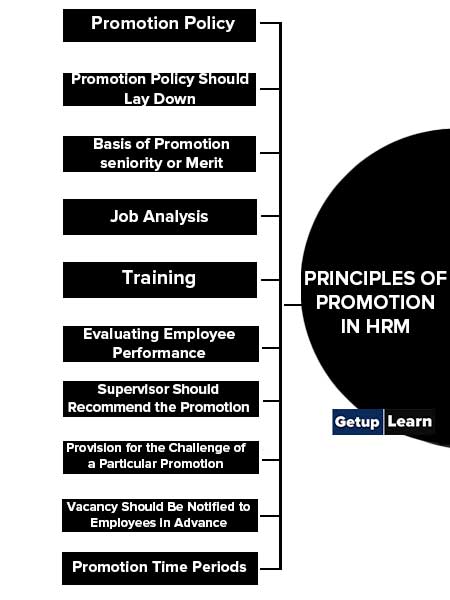
Promotion Policy
The promotion policy should be in writing and must be understood by all employees to avoid any suspicion regarding the line of promotion in the minds of employees.
Promotion Policy Should Lay Down
The promotion policy should lay down what percentage of vacancies in higher levels of hierarchy are to be filled up by promotion and it should be followed strictly.
It is better to incorporate a statement of management intention that higher paid and better jobs will be filled by promotion from within, if possible, rather than by hiring from outside. If it is necessary to go outside to fill specific skilled or professional jobs, it should be notified in advance.
Basis of Promotion-seniority or Merit
The promotion policy should mention the basis of promotion-seniority or merit. A sound policy should be based on both considerations i.e. seniority and ability. Primarily it would emphasize the merit giving due weightage to seniority. If two persons are equal in merit and seniority, seniority should be the basis of promotion.
Job Analysis
Job analysis decides the position of the jobs and their relationship to other positions. This should be charted to provide clear recognition of the natural movement from one job to another.
Positions may be adjusted and arranged so that one position prepares workers for another and a natural course of advancement throughout the organization or within each division or department may be provided. Employees should be fully aware of the plan so that they may prepare themselves for higher positions.
Training
Promotion programs should be closely allied to training programs; which enables the employees to improve themselves for promotions.
Evaluating Employee Performance
A scientific procedure for evaluating employee performance should be followed. The assessment of employees and confidential reporting should be objective so that every employee has a faith in the promotion policy and is motivated for better performance of work to get the promotion.
Supervisor Should Recommend the Promotion
The supervisor or the immediate boss should recommend the promotion which is subject to approval by his immediate superior in the line. The final decision in this respect should be taken by the top executive in line with the advice and assistance of the personnel department is a staff capacity. This serves as a check on the fairness of promotion and ensures that the policy will be consistently administered.
Provision for the Challenge of a Particular Promotion
The promotion policy should contain a provision for the challenge of a particular promotion by the employee or union within the limits of the promotion policy to ensure fairness in management decisions.
Vacancy Should Be Notified to Employees in Advance
A vacancy or a would-be vacancy should be notified to employees in advance so that interested employees may apply within a specified period. If possible, the candidate should be selected before the job actually becomes vacant.
Promotion Time Periods
The promotion, at first, should be made on probation. If he works satisfactorily during the probation period, he should be made permanent.
Not all people within an organization want promotion because some feel that they will leave a congenial workgroup or they will not be able to handle the responsibilities of a higher job or they may have certain other reasons.
Promotion should not be forced on such reluctant employees and they should be allowed to continue their present assignments.
Types of Promotion in HRM
There are three types of promotion based on the following criterion:
- Seniority Based Promotion in HRM
- Merit-Based Promotion
- Seniority-cum-merit Basis
- Multiple Chain Promotion
- Up or Out Promotion
- Dry Promotion
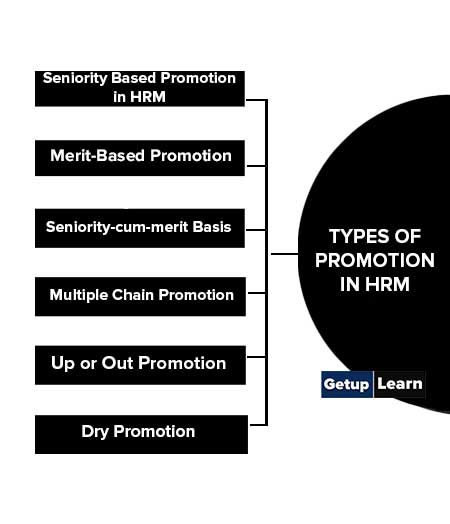
Seniority Based Promotion in HRM
Seniority means the length of recognized service in an organization. If seniority is adopted as the basis of promotion, the senior most person in the lower grade shall be promoted as and when there is an opening in the higher position, The logic behind considering seniority as a basis of promotion is that there is a positive correlation between the length of service in the same job and the amount of knowledge and the level of skill acquired by an employee in an organization.
Seniority on the basis of length of recognized service in the organization is decided by the organization and every employee knows his place in the promotion line. There will be no chance of favoritism or dispute regarding promotion. Seniority is widely recognized as the basis of promotion in almost all types of organizations, particularly in organizations where trade unions are strong.
Advantages of Seniority Based Promotion in Hrm
The advantages of seniority based promotion in HRM are as follows:
- It is relatively easy to measure the length of service and judge the seniority.
- Trade unions generally emphasize seniority rather than on merit as a basis of promotion.
- The employees trust this method as there is no scope for favoritism, discrimination, and judgment.
- Security and certainty are also a plus point in the use of seniority. Employees can predict when and how they will be promoted. It increases employee morale and gives the employees a sense of satisfaction.
- It minimizes the scope for grievances and conflicts regarding promotion.
- Seniority as the basis of promotion helps in reducing labor turnover because an employee will not easily give up his seniority in the organization.
Disadvantages of Seniority Based Promotion in HRM
Following are some points of disadvantages of seniority based promotion in HRM:
- It is not necessary that employees learn more with the length of service. The employees may learn up to a certain age and learning capabilities may diminish beyond a certain age.
- It demotivates the young and more competent employees and results in greater labor turnover.
- It kills the zeal and interest for self-development as everybody will be promoted without showing any all-around growth or promise.
- Judging the seniority, though, may seem very easy in a theoretical sense, is highly difficult in practice, as so many problems like job seniority, company seniority, service in different organizations, trainee, researcher, etc. will crop up.
Merit-Based Promotion
Merit means the ability to work. It denotes an individual employee’s skill, knowledge, ability, efficiency, and aptitude as measured from educational, training, and past employment record. If merit is adopted as the basis of promotion the ablest person in the lower grade, no matter howsoever junior he may be in the company shall be promoted.
It encourages all employees to improve their efficiency. Management personnel generally prefer merit as the basis of promotion. Merit may be determined by job performance and by analysis of employee potential for development through written or oral examinations or personal interviews or other records of performance. Thus, ‘ability’ ignores the value of experience.
Advantages of Merit Based Promotion in HRM
These are advantages of merit based promotion in HRM:
- The skills of an employee can be better utilized at a higher level. It results in maximum utilization of human resources in an organization.
- Competent employees are motivated to exert all their energies and contribute to organizational efficiency and effectiveness.
- This system continuously encourages the employees to acquire new skills, knowledge, etc. for all-around development.
Disadvantages of Merit Based Promotion in HRM
Following are some points of disadvantages of merit based promotion in HRM:
- Measuring merit is not always easy.
- Many employees, particularly, trade unions distrust the management’s integrity in judging merit.
- The techniques of merit measurement are subjective.
- The purpose of promotion may not be served if merit is taken as the sole criteria for the promotion. Merit should mean future potentiality but not past performance. This method takes into consideration past achievements but not future success.
Seniority-cum-merit Basis
There is a great controversy on the question of whether promotions should be given on the basis of seniority or merit. Managers mostly prefer merit as the basis of promotion as they are interested in enriching organizational effectiveness by enriching its human resources.
But, trade unions favor seniority as the sole basis for promotion with a view to satisfying the interests of the majority of their members. The most widely used basis of promotion combines both ability and seniority. The best policy would be to ensure that whenever there are two employees of equal seniority, merit or ability should be the deciding factor in a promotion.
Where, however, there are two employees of almost equal competence, seniority should be the decisive factor. Such a policy should satisfy both the management and the trade unions. Hence, a combination of both seniority and merit may be considered a sound basis for promotion.
Multiple Chain Promotion
Multiple chain promotion provides a systematic linkage of each position to several others. It provides multi-promotional opportunities through clearly defined avenues of approach to and exit from each position in the organization.
Up or Out Promotion
In this case, an employee either earns a promotion or seeks employment elsewhere. Out promotion usually leads to the termination of employment and joining some other organization in a better position.
Dry Promotion
In this type, promotion is given in lieu of an increase in salary. For example, when a university professor is made Head of the Department, there is no increase in salary.
What is the meaning of promotion?
Promotion refers to the upward movement of an employee from a current job to another that is higher in pay, responsibility, status, and organizational level. A mere shifting of an employee to a different job that has better working hours, better location, and more pleasant working conditions does not imply promotion. The new job will be promoted only if it entails increased responsibilities and enhanced pay.
What’s the promotion definition?
A promotion is the transfer of an employee to a job that pays more money or that enjoys some preferred status. BY Scott and Spreigal
What are the principles of promotions?
These are the principles of promotions in hrm:
1. Promotion Policy
2. Promotion Policy Should Lay Down
3. Basis of Promotion-seniority or Merit
4. Job Analysis
5. Training
6. Evaluating Employee Performance
7. Supervisor Should Recommend the Promotion
8. Provision for the Challenge of a Particular Promotion
9. Vacancy Should Be Notified to Employees in Advance
10. Promotion Time Periods.
What are the types of promotion?
Types of promotion:
1. Seniority Based Promotion in HRM
2. Merit-Based Promotion
3. Seniority-cum-merit Basis
4. Multiple Chain Promotion
5. Up or Out Promotion
6. Dry Promotion.


